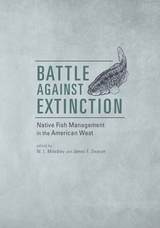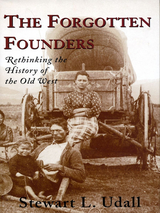
Nearly a third of the native fish fauna of North America lives in the arid West; this book traces their decline toward extinction as a result of human interference and the threat to their genetic diversity posed by decreases in their populations. What can be done to slow or end this tragedy? As the most comprehensive treatment ever attempted on the subject, Battle Against Extinction shows how conservation efforts have been or can be used to reverse these trends.
In covering fishes in arid lands west of the Mississippi Valley, the contributors provide a species-by-species appraisal of their status and potential for recovery, bringing together in one volume nearly all of the scattered literature on western fishes to produce a monumental work in conservation biology. They also ponder ethical considerations related to the issue, ask why conservation efforts have not proceeded at a proper pace, and suggest how native fish protection relates to other aspects of biodiversity planetwide. Their insights will allow scientific and public agencies to evaluate future management of these animal populations and will offer additional guidance for those active in water rights and conservation biology.
First published in 1991, Battle Against Extinction is now back in print and available as an open-access e-book thanks to the Desert Fishes Council.

Nearly a third of the native fish fauna of North America lives in the arid West; this book traces their decline toward extinction as a result of human interference and the threat to their genetic diversity posed by decreases in their populations. What can be done to slow or end this tragedy? As the most comprehensive treatment ever attempted on the subject, Battle Against Extinction shows how conservation efforts have been or can be used to reverse these trends.
In covering fishes in arid lands west of the Mississippi Valley, the contributors provide a species-by-species appraisal of their status and potential for recovery, bringing together in one volume nearly all of the scattered literature on western fishes to produce a monumental work in conservation biology. They also ponder ethical considerations related to the issue, ask why conservation efforts have not proceeded at a proper pace, and suggest how native fish protection relates to other aspects of biodiversity planetwide. Their insights will allow scientific and public agencies to evaluate future management of these animal populations and will offer additional guidance for those active in water rights and conservation biology.

The environmental movement today is at a critical crossroads. Crossroads: Environmental Priorities for the Future is an in-depth assessment of the movement's successes and failures, and also offers prescriptions for the future. It includes contributions from some of the country's top environmental leaders and activists, including Barry Commoner, Stewart Udall, William K. Reilly, Gus Speth, Jay Hair, Lois Gibbs, Michael Frome, Chuck Little, and William Futrell.

"…an impressive new book… [The Forgotten Founders] is a gem that encompasses virtually every aspect of the development of our region." -ROCKY MOUNTAIN NEWS
"[Udall] offers a convincing argument that it wasn't the cavalry, fur traders, prospectors, gunslingers or railroad builders who tamed the West; it was 'courageous men and women who made treks into wilderness and created communities in virgin valleys.' Udall's spare prose adds impact to his words." -THE SEATTLE TIMES
"The West is so cluttered with misconceptions that it is hard to have a serious discussion about its history." --Wallace Stegner.
For most Americans, the "Wild West" popularized in movies and pulp novels -- a land of intrepid traders and explorers, warlike natives, and trigger-happy gunslingers -- has become the true history of the region. The story of the West's development is a singular chapter of history, but not, according to former Secretary of the Interior and native westerner Stewart L. Udall, for the reasons filmmakers and novelists would have us believe.
In The Forgotten Founders, Stewart Udall draws on his vast knowledge of and experience in the American West to make a compelling case that the key players in western settlement were the sturdy families who travelled great distances across forbidding terrain to establish communities there. He offers an illuminating and wide-ranging overview of western history and those who have written about it, challenging conventional wisdom on subjects ranging from Manifest Destiny to the importance of Eastern capitalists to the role of religion in westward settlement.
Stewart Udall argues that the overblown and ahistorical emphasis on a "wild west" has warped our sense of the past. For the mythical Wild West, Stewart Udall substitutes a compelling description of an Old West, the West before the arrival of the railroads, which was the home place for those he calls the "wagon people," the men and women who came, camped, settled, and stayed. He offers a portrait of the West not as a government creation or a corporate colony or a Hollywood set for feckless gold seekers and gun fighters but as primarily a land where brave and hardy people came to make a new life with their families. From Native Americans to Franciscan friars to Mormon pioneers, these were the true settlers, whose goals, according to Stewart Udall were "amity not conquest; stability, not strife; conservation, not waste; restraint, not aggression." The Forgotten Founders offers a provocative new look at one of the most important chapters of American history, rescuing the Old West and its pioneers from the margins of history where latter-day mythmakers have dumped them. For anyone interested in the authentic history of the American West, it is an important and exciting new work.

READERS
Browse our collection.
PUBLISHERS
See BiblioVault's publisher services.
STUDENT SERVICES
Files for college accessibility offices.
UChicago Accessibility Resources
home | accessibility | search | about | contact us
BiblioVault ® 2001 - 2024
The University of Chicago Press









